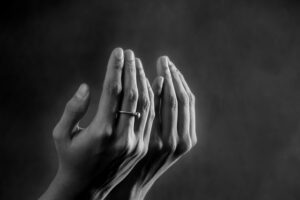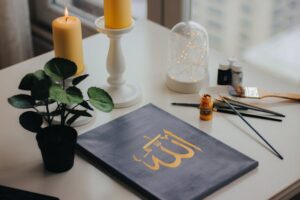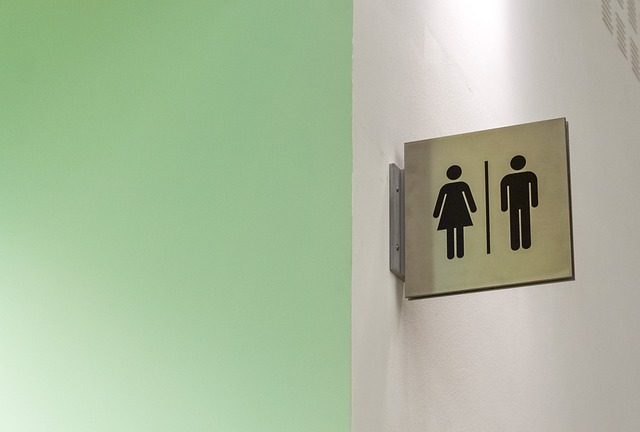
In the Name of Allah—the Most Compassionate, Most Merciful.
In Islamic tradition, making dua or supplication before undertaking different daily activities is highly encouraged. All duas serve as reminders of our connection to Allah and the spiritual aspect of our lives, even in the most mundane tasks.
Among these routine activities is entering and leaving the toilet, an act accompanied by dua taught by the Prophet Muhammad (PBUH).
Read on as we explore the prayers to recite before entering and after leaving the toilet, their significance, the Sunnah and etiquettes of entering and leaving the toilet, and the benefits of reciting prayers while doing so.
Dua to Recite Before Entering the Toilet

Before entering the toilet, it is Sunnah to recite a dua seeking refuge with Allah from the evil and shayateen that frequent places of washroom and bathroom.
This supplication embodies the Islamic principle of always remembering Allah, seeking His protection, and maintaining spiritual purity.
English Transliteration
“Bismillah, Allahumma innee A’oozubika minal Khubusi wal Khabaa’iss”
English Translation
What Is the Hadith regarding making Dua before Entering the Toilet?
The Hadith regarding the dua before entering the toilet highlights a beautiful aspect of Islamic practice, intertwining daily activities with spiritual mindfulness.
This supplication is not merely a ritual but a profound act of seeking Allah’s protection from the shayateen (devils) and evil influences that are believed to inhabit or frequent places of impurity, such as bathrooms and toilets.
As discussed above, the specific dua before entering the toilet is mentioned in several Hadiths, underscoring its importance. The Prophet Muhammad (PBUH) taught his followers to say:
English Transliteration
“Allahumma inni a’udhu bika minal khubthi wal khaba’ith”
English Translation
This dua is reported in Sahih Bukhari and Sahih Muslim, two of the most respected collections of Hadith in the religion Islam, indicating the authentic teachings of the Prophet Muhammad (PBUH). The invocation before entering the toilet serves multiple purposes in a Muslim’s life, such as:
- Acknowledgment of Allah’s Sovereignty: It reaffirms the believer’s acknowledgement of Allah as the sole protector and sustainer, capable of shielding one from harm, seen and unseen.
- Spiritual Protection: The dua is a form of spiritual protection against the shayateen that might harm a person in the toilet. In Islamic cosmology, such locations are considered susceptible to the presence of impure spirits, making this supplication essential for seeking Allah’s refuge.
- Purity and Cleanliness: In Islam, physical cleanliness is linked to spiritual purity. By this dua, a Muslim remembers the importance of cleanliness and purity, which are crucial elements of faith.
- Comprehensive Faith Practice: This practice exemplifies how Islam encompasses every aspect of a believer’s life, integrating daily routines with spiritual acts. Such prayers ensure that a Muslim remains connected to Allah throughout the day, in all activities, both big as well as small ones.
- Teaching Humility: It serves as a reminder that humans are in constant need of Allah’s encompassing protection and mercy, even in private moments when one is alone and unseen.
Dua to Recite When Leaving the Toilet

Upon leaving the toilet, there is another dua that sincerely thanks Allah for the ease and unwavering protection provided. This heartfelt supplication acknowledges Allah’s pivotal role in all facets of life, strongly emphasising gratitude and the constant remembrance of Allah’s abundant favours.
English Transliteration
“Gufranaka, Alhamdulilla hil Lazi Azhaba Annil aza wa Aafanee”
English Translation
Dua to Recite When Entering and Leaving Home

While the focus of this blog is on the dua for entering and leaving the toilet, it’s worth noting that there are specific duas for many daily activities, including entering and leaving one’s home. These duas further highlight the importance of remembering Allah throughout the day and in all actions.
English Transliteration
“Allahumma inni as’aluka khairal mawliji wa khairal makhraji, bismillahi walajna, wa bismillahi kharajna wa ‘ala Allahi rabbina tawakkalna.”
“Bismillahi tawakkaltu ‘alallahi la hawla wa la quwwata illa billah.”
English Translation
These duas underscore the concept of the home as a blessed space, with the recitation serving as a bridge connecting the believer’s movements to Allah’s encompassing protection and guidance.
Sunnah and Etiquettes of Entering and Leaving the Toilet
The Sunnah and etiquettes of entering and leaving the toilet reflect the comprehensive guidance Islam provides on cleanliness, privacy, and mindfulness. These practices are not just about physical purity but also about nurturing a sense of respect and dignity in one’s private moments.
They embody the principle that every action, no matter how mundane, can be turned into an act of worship when performed with the right intention. Without further ado, below are key etiquettes and Sunnah practices related to the bathroom, each offering a blend of spiritual and practical wisdom.
- Enter with your left foot first – this acts as a step towards humility and cleanliness.
- Say the dua before entering, seeking protection from Allah against harmful entities.
- Exit with your right foot, symbolising the return to purity and the presence of the divine.
- Recite the dua after exiting, expressing gratitude to Allah for health and well-being.
- Keep silent, focusing on the task at hand without engaging in conversation or distractions.
- Maintain cleanliness, ensuring that the toilet is left in a state of hygiene for the next user.
- Ensure privacy by locking the door if possible and respecting the sanctity of personal spaces.
- Avoid facing the Qibla (direction of the Kaaba), aligning with respect for sacred directions.
- Use water for purification if available, emphasising the importance of cleanliness in Islam.
- Remember Allah upon exiting, keeping the remembrance of God in even private moments.
Benefits of Reciting Bathroom Duas
Reciting bathroom duas before entering and after leaving the toilet encapsulates the Islamic ethos of mindfulness and purification in every aspect of life.
These supplications are not merely routine utterances but profound reminders of a Muslim’s continuous connection to Allah, even during personal moments. The benefits of these duas extend beyond spiritual merit. Some of these include:
Spiritual Protection
Reciting bathroom duas offers a shield of spiritual protection, invoking Allah’s refuge from unseen harm and impurities. This practice acknowledges the existence of negative influences in even the most mundane places and seeks divine safeguarding against them.
By uttering these duas, Muslims reinforce their belief in the unseen and the omnipresence of divine protection, fostering a sense of security that transcends the physical realm and guards the soul against spiritual pollutants.
Remembrance of Allah

The act of reciting duas as one enters and exits the toilet serves as a continuous reminder of Allah’s presence in every moment. This constant remembrance elevates routine activities to acts of worship, keeping the heart and mind engaged with the divine.
It transforms a simple act of hygiene into a spiritual practice, deepening the believer’s relationship with Allah and integrating consciousness of the Creator in all aspects of daily living, ensuring that no moment is devoid of spiritual significance.
Promotion of Cleanliness and Hygiene
Islam places a high emphasis on cleanliness, considering it part of faith. The bathroom duas encapsulate this principle, encouraging purity not just in the spiritual sense but also in physical cleanliness.
Reciting these supplications reinforces the importance of maintaining a clean environment and personal hygiene. This dual focus on the physical and spiritual aspects of cleanliness promotes overall well-being, reflecting the holistic approach of Islam towards purity.
Summary – Dua When Entering and Leaving Toilet
The practice of reciting duas before entering and after leaving the toilet is a beautiful aspect of Islam that blends spiritual mindfulness with daily routines. These duas serve as a protection against evil, a reminder of our dependence on Allah for purification, and a clear expression of gratitude for His blessings.
By adhering to these practices, Muslims reinforce faith, enhance spiritual well-being, and maintain physical cleanliness. This approach to even the most private aspects of life is a testament to the holistic nature of Islamic teachings – always seeking the protection and blessing of Allah






